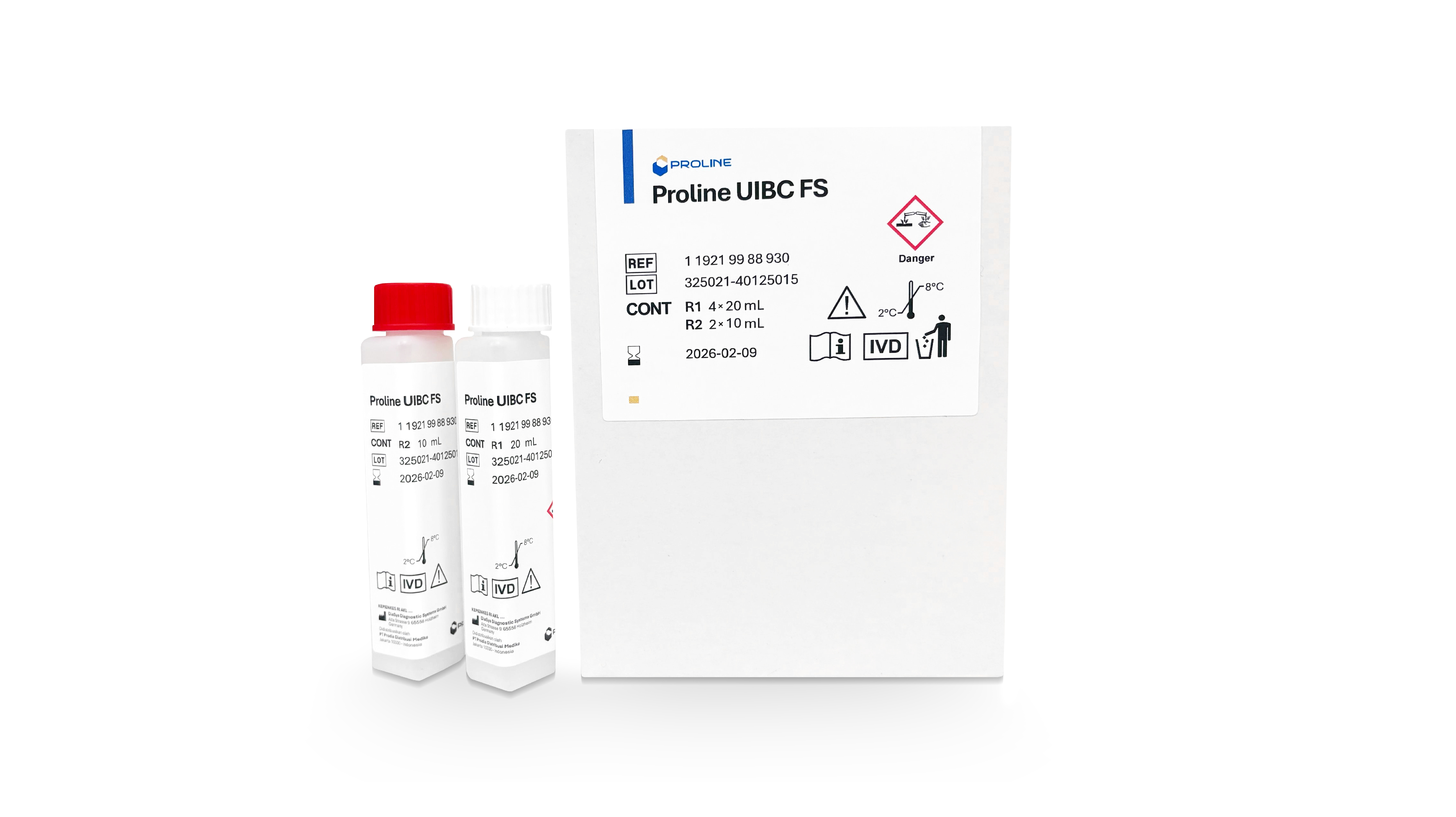Proline UIBC FS

| Catalogue Number | R1 Reagent Volume | R2 Reagent Volume |
| 1 1921 99 88 921 | 4 x 21 mL | 4 x 6 mL |
| 1 1921 99 88 930 | 4 x 20 mL | 2 x 10 mL |
Diagnostic reagent for quantitative examination of unsaturated iron binding capacity (UIBC) in human serum or plasma using a photometric system.
Unsaturated Iron Binding Capacity (UIBC) measures the capacity of transferrin that is not yet bound to iron in the blood serum. This parameter helps assess the body's iron status, where high values may indicate iron deficiency, while low values are associated with iron overload or chronic inflammation. Research suggests that UIBC can serve as an alternative for detecting hereditary hemochromatosis and assessing iron reserves in the body.
UIBC plays a role in evaluating iron balance, which impacts various organs, particularly the liver, bone marrow, and kidneys. The liver regulates iron metabolism, and low UIBC values may indicate conditions such as hemochromatosis. Bone marrow utilizes iron for red blood cell production, so high UIBC may signal iron deficiency. The kidneys also contribute to the excretion and regulation of iron-binding proteins, meaning kidney dysfunction can affect UIBC levels.
Unsaturated Iron Binding Capacity (UIBC) is a laboratory parameter that measures the capacity of transferrin that is not yet bound to iron in the blood serum. Changes in UIBC values may indicate several health conditions:
- Iron Deficiency Anemia: UIBC increases as the body produces more transferrin to bind available iron, indicating higher iron-binding capacity.
- Iron Overload (Hemochromatosis): UIBC decreases because transferrin is saturated with iron, reducing additional binding capacity.
- Chronic Inflammatory Diseases: UIBC may decrease as transferrin production declines in response to inflammation, reducing iron-binding capacity.
- Hemolytic Anemia: UIBC decreases due to increased iron release from destroyed red blood cells, leading to transferrin saturation.
- Sideroblastic Anemia: UIBC decreases due to impaired iron utilization in the bone marrow, causing iron accumulation and transferrin saturation.
Photometric test using Ferene.
- Ready-to-use liquid reagent (open-system) without reconstitution.
- Excellent linearity and stability performance.
- Available in MPK (Multi-Purpose Kit) and dedicated kit.
| Sample type | Human serum or plasma heparin |
| Measurement range | 14 µg/dL - 625 µg/dL |
| Analysis wavelength | 600 - 620 nm, Hg 578 nm, 623 nm |
| Analysis mode | End point |
| Reagent volume used (analyzer manual) | 250 µL - 1000 µL |
| Sample volume used (analyzer manual) | 75 µL |
| Storage temperature | 2 – 8 °C |
| Open vial stability | 18 months |
| Expiration date | 18 months |
| Reference Range: | ||
| µg/dL | µmol/L | |
| Serum/Plasma | 120 - 470 | 21 - 84 |
- UIBC Reagent
- Doos
- Kit insert
- Reagents bottle
- Proline Lipase DC FS Kit Insert (14321 01 – Mar 2024/00)
- Murtagh, Luke J BS, MB1; Whiley, Michael BS, MB, FRACP2; Wilson, Susan PhD3; Tran, Huy BS, MB, FRACP2; Bassett, Mark L MD, FRACP. Unsaturated Iron Binding Capacity and Transferrin Saturation Are Equally Reliable in Detection of Hfe Hemochromatosis. American Journal of Gastroenterology 97(8):p 2093-2099, August 2002. | DOI: 10.1111/j.1572-0241.2002.05927
- Mukherjee D, Sharma S, Mahapatra D, Nair RK, Datt B, Arora D. A rare presentation of nephrotic syndrome. CEN Case Rep. 2017 Nov;6(2):161-163. doi: 10.1007/s13730-017-0266-1. Epub 2017 Jun 30. PMID: 28667506; PMCID: PMC5694404.
- Faruqi A, Zubair M, Mukkamalla SKR. Iron-Binding Capacity. [Updated 2024 May 2]. In: StatPearls [Internet]. Treasure Island (FL): StatPearls Publishing; 2025 Jan-. Available from: https://www.ncbi.nlm.nih.gov/books/NBK559119/
- Brochure : INA
- Iron metabolism
Contact our team to find out more product information and ordering
- Telp : +62 21 8984 2722
- WhatsApp : +62 815 1359 2626
- Email : marketing@proline.co.id
Contact our Technical support team for further assistance with product specifications, services and other technical documents.
- Telp : +62-21-8984-2722
- WhatsApp : +62-817-9324-884
- Email : technical.support@prodis.co.id
